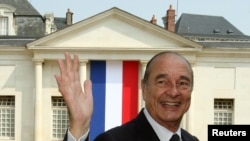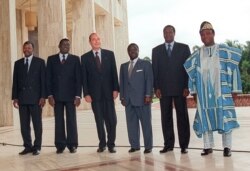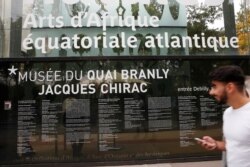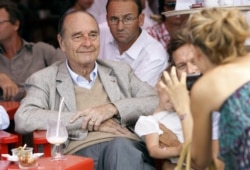France is mourning former president Jacques Chirac, a veteran politician and champion of multilateralism, European unity and Africa, who died Thursday at age 86.
French lawmakers observed a minute of silence and President Emmanuel Macron is addressing the the nation later in the day.
Jacques Chirac was the ultimate political survivor: Mayor of Paris for 18 years, before becoming prime minister and later president for more than a decade.
He will be remembered for many things, including being the first French head of state to acknowledge his country's role in the Holocaust, in a 1985 speech.
For also opposing the U.S.-led invasion of Iraq in 2003, leading to retaliatory freedom fries served at U.S. restaurants and the dumping of Bordeaux wine into gutters — even as anti-war supporters cheered him on.
He will also be remembered for being a staunch fan of Africa. Chirac was close friends with several African leaders, including Omar Bongo of Gabon, Blaise Compaore of Burkina Faso and the Republic of Congo’s Denis Sassou Nguesso.
He founded the Quai Branly Museum that showcases art from Africa, along with Oceana and the Americas.
In 2016, it was renamed the Quai Branly-Jacques Chirac Museum. Critics, however, claim such ties also underscored the downside of France’s continued influence on its former colonies, known as “France-Afrique.”
At home, Chirac had a mixed record. In a shock election in 2002, he found himself in a runoff against far-right leader Jean-Marie Le Pen — winning easily in what many called a vote against extremism. But he failed to overhaul the economy, or sustainably address tensions of disenfranchised youngsters with immigrant backgrounds in France’s gritty suburbs, which exploded in 2005.
But his popularity rebounded after leaving power in 2007 — even as some of the corruption allegations dogging him for years finally caught up with him in court. Still, many remember Chirac for his charm and his common touch, a man at ease with both diplomats and farmers.











